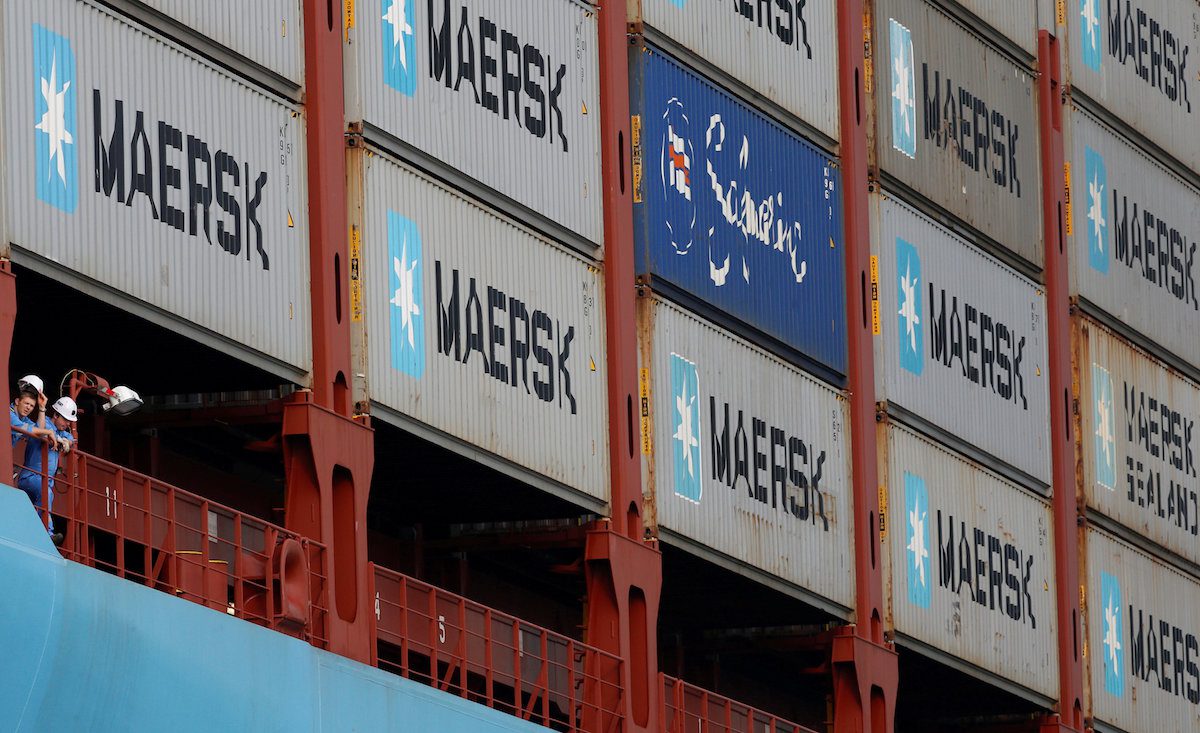REUTERS/Edgar Su/File Photo
 By Stine Jacobsen
By Stine Jacobsen
COPENHAGEN, Feb 8 (Reuters) – Danish shipping and oil group A.P. Moller-Maersk plunged to an unexpected loss last year, hit by impairments and a weak performance in container shipping, and halved its dividend to try to protect its credit rating.
However, the world’s biggest container shipping company said on Wednesday it saw signs of improvement in an industry that has suffered for years from a glut of vessels and sluggish global trade, with freight rates rising and business picking up.
“We believe we are at an inflexion point … If you go one year back, we hit a low point in demand. We have slowly but surely seen a recovery,” Chief Financial Officer Jakob Stausholm said on a conference call.
The Maersk Line container shipping business said it expected a $1 billion improvement in underlying operating profit this year, from a loss of $384 billion in 2016, with industry demand rising 2-4 percent compared with around 2 percent last year.
Nonetheless, the group’s shares dropped as much as 7 percent to a 2-month low of 10,810 Danish crowns, as investors focused on a surprise $2.6 billion of impairments and the halving of the dividend to 150 crowns a share compared with the year before.
“Maintaining investment grade rating remains crucial for Maersk, hence we are not surprised to see capital preservation put high on the agenda,” said analysts from brokerage Fearnleys’ shipping team, who have an “accumulate” rating on the stock.
In December, Moody’s downgraded Maersk’s credit rating to Baa2 from Baa1 with a negative outlook, echoing Standard & Poor’s cut to BBB from BBB+ with a negative outlook in November – both close to the lowest investment grade levels. Below those levels, Maersk’s borrowing costs would be higher.
“We will do what it takes to remain there (in investment grade territory),” Stausholm said.
NEW CHAIRMAN
With Maersk’s energy business also suffering from a drop in oil prices in recent years, new group Chief Executive Soren Skou announced a far-reaching restructuring plan in September.
This included bulking up the group’s transport and logistics operations while seeking alliances or a separate listing for its capital intensive energy division.
The group said on Wednesday there would be further change, as it proposed Jim Hagemann Snabe, the former co-CEO of German software company SAP as its new chairman.
He will replace Michael Pram Rasmussen, who steps down at the end of March after 14 years in the job.
Snabe has recently also been proposed as chairman of German engineering group Siemens.
“It is about execution now,” said Otto Friedrichsen, equity strategist at Danish asset manager Formuepleje. “With the change in the board, they have set the team to execute on the announced strategy.”
Formuepleje, with around 45 billion crowns allocated in bonds and equities, has shunned the shipping industry, including Maersk, and sees no point in returning just yet.
“The optimism is very much dependent on Maersk Line and it still looks challenging,” Friedrichsen said.
Maersk Line, with a fleet of more than 600 ships, joined a wave of dealmaking in the shipping industry last year when it agreed to buy the world’s No.7 container shipping line Hamburg Sud, its first major acquisition for more than a decade.
Final agreement is expected early in the second quarter, with regulatory approvals by the end of 2017, Maersk said.
After years of cost cutting, the group said it was in good shape to benefit from any recovery in container shipping, which largely ships consumer goods, ranging from iPhones to dresses.
“Suddenly demand exceeds supply,” Stausholm said, adding the group was starting the year in “a very strong position with strong volumes and record-low unit costs.”
The level of idled capacity remained at a record-high, despite freight rates picking up, he said.
Maersk reported a fourth-quarter net operating loss after tax of $2.7 billion, missing analysts’ average forecast for a profit of $324 million.
The result reflected an impairment of $1.5 billion at Maersk drilling and one of $1.1 billion at Maersk Supply Service.
For 2017, the group sees a higher underlying net profit than the $711 million achieved in 2016.
(Reporting by Stine Jacobsen; Editing by Jason Neely and Mark Potter)
(c) Copyright Thomson Reuters 2017.

 Join The Club
Join The Club











